Who are the Yousriya Loza-Sawaris Scholarship program (YLSS) Scholars? What can you expect if you enter YLSS?
To find out we reached out to six past and present YLSS scholars. They told us about their experiences studying through YLSS in the Master of Development Practice program (MDP) at the University of Minnesota, and gave advice for those considering the program.
Varied Backgrounds, Common Commitment
Sara Zagloul, a 2020 graduate of the MDP program, comments on how much she’s been able to cover within the program, where she plans a minor in urban and regional planning. “Urban development, transportation, energy, urban planning, such an interdisciplinary program,” she says. “People from so many fields fit perfectly.” Other scholars have also been able to tailor their study to their own interests, from finance to gender studies.
The MDP does not require a major in any particular field to enter. While social science backgrounds are common, Sara Zagloul points to her own degree in architectural engineering as an example of the existing diversity; classmates had studied fields from computer science to pharmacy. What is primarily sought is community involvement, shown in volunteer or professional activity across the varied early histories of all six interviewed scholars—
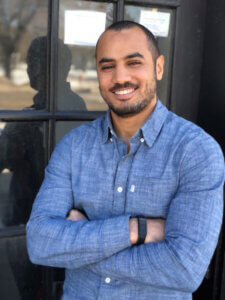
Mohamed Fouad
- Mohamed Fouad, one of the first YLSS scholars, had been a banker in upper Egypt for six years before entering the program. With a bachelor’s degree in business from Suez Valley University as well as an MBA in financial management, he had also volunteered for several years as financial adviser to a new NGO helping deaf and deaf/mute people.
- Nayera ElHusseiny, another program graduate, initially studied political science at Cairo University, minoring in statistics. With a scholarship to the University of Chicago she explored the social sciences more broadly her last two undergraduate years, “history, sociology, economics….” Volunteering in a community center in a Cairo slum in the summers and graduating at the time of the Egyptian Revolution, she gained an enduring interest in civil society. She worked for about two years as an assistant for the education sector of the Sawiris Foundation for Social Development, sponsor of YLSS, remaining eligible for YLSS because the scholarship’s selection process is independently managed.
- First-year YLSS scholar Neamatallah Elsayed was also a political science major at Cairo University, with a minor in economics, but in addition holds a degree in liberal arts and sciences from the Cairo Initiative for Liberal Arts and Science. After graduation she worked “in the kitchen, where everything gets done,” at the Ministry of Planning, Monitoring and Administrative Reform of Egypt, actively involved in sustainable development initiatives.
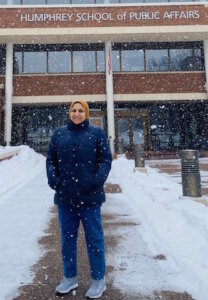
Naematallah El-Sayed
- Sara Ragab Hussien, another first-year YLSS scholar, studied economics at Cairo University and on scholarship at the University of Chicago. Statistics was a minor. Following graduation she interned in communications for urban participatory development projects conducted by the German Corporation for International Cooperation (GIZ), then in monitoring and evaluation for United Nations world food programs.
- Recent MDP graduate, Yasmine Hesham Mansour, also worked with UN food programs, with a focus on food assistance to refugees and unprivileged Egyptians, and with the Magdi Yacoub Heart Foundation on the development team, working to get world-class cardiovascular treatment to the underprivileged. Her undergraduate major was statistics with a minor in economics.
- Sara Zagloul as an undergraduate studied architectural engineering at Cairo University. Deciding she did not want to work in a “traditional architecture office,” she had trouble because of her major finding the long-term development position she was seeking, though she did become involved with a project funded by the European Union promoting urban development and sustainable energy in Southern Mediterranean countries, and then for GIZ promoting efficient water use in agriculture.
What You Need to Succeed
All six scholars interviewed agreed that the MDP had been a life-changing experience for them, well worth pursuing—for the right person. Beyond the basic requirements,”You have to be serious,” says Mohamed Fouad. Both he and the others emphasized that the varied classes and projects mean “work, work, work.”
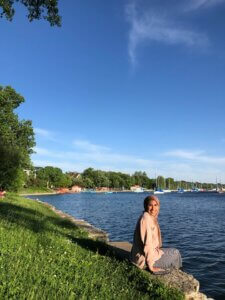
Sara Ragab
“Flexibility is extremely important,” says Sara Ragab. “I’m a perfectionist and love to have things planned out. “I was surprised when I came here but it was good. It helped me grow, not only on an academic level, and to work under stress.”
“You have to be open,” Mohamed continues. “Many projects are group projects. You have to be open to accept different people, different nationalities, different ideas…..”
“Prepare to be self-criticizing,” says Sara Zahloul. “If you’re not, you won’t like development.”
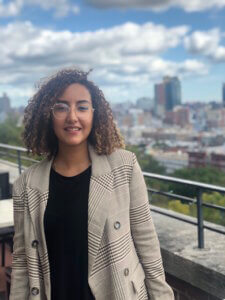
Sara Zaghloul
Go for It
Other scholars have also seen themselves grow to meet program demands. They encourage candidates not to be intimidated.
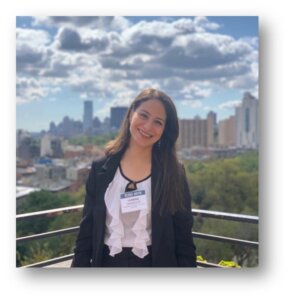
Yasmine Hesham
Remembering her initial lack of self-confidence, Yasmine encourages new scholars to avoid similar worries. “The committee that chooses us, they know your abilities and potential,” she comments. “The first projects here were overwhelming but we did it all and we did it perfectly fine…Anyone who applies and is selected, they should know they deserve to be here.”
“Be kind to yourself,” says Sara Ragab. “As one of my professors would say, ‘pat yourself on the back,’ whenever you do something successfully. Acknowledge you did some hard work, and give yourself a break.”
“If you ever feel the program is overwhelming,” says Neamatallah, “you will find ….whenever you reach out for help you will find it….and you will not be alone going through it, the whole cohort will be in the same situation. You will find people more than happy to help you going through that.”
“We are privileged to have each other,” comments Yasmine. “There are many Egyptians here who were supportive of me and changed the experience….with the scholarship we have an extra support network, and you’ll never be alone here.”
“Just go for it, this program is great!,” says Nayera ElHusseiny.
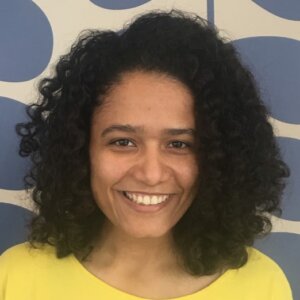
Nayera ElHusseiny
In part 2 we’ll take a closer look at our scholars’ experiences during the MDP and after.
